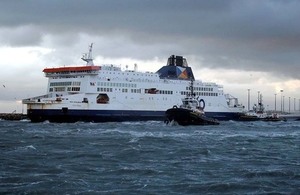News story: David Mundell speech: 20 years of Scottish devolution
In a keynote speech in Edinburgh today [21 January] the Scottish Secretary will mark twenty years of Scottish devolution
Two decades on from the establishment of the Scottish Parliament, Mr Mundell will reaffirm that Brexit will further strengthen the devolution settlement, with new powers being transferred directly to Holyrood. He will also note that work is progressing well in developing new ways of joint working between the UK and Scottish governments. In the speech, he will also reject ‘power grab’ accusations.
Mr Mundell will say:
Devolution is working well:
I am a passionate supporter of devolution. I was proud to be elected as an MSP in that first intake in May 1999.
Two decades on, Holyrood has become one of the most powerful devolved parliaments in the world. Power and accountability are better balanced than ever before.
The vote in 1997 was re-affirmed by our decision in 2014 to remain part of the UK. And in the 2017 general election there was overwhelming support for devolutionist parties and support for a strong Scottish Parliament within the UK.
Reject ‘power grab’ accusations:
It was claimed that the Sewel Convention was breached or, if it hadn’t been breached, it was not fit for purpose and must be changed. In fact, the Sewel Convention remains an essential element in the devolution settlement.
To listen to the rhetoric coming from some of my political opponents, you could be forgiven for thinking that Holyrood is being stripped of a whole raft of powers it currently exercises. It is complete fantasy; an invented grievance. The reality is that more than 100 powers previously exercised in Brussels will transfer to Edinburgh on the day we leave the EU.
To characterise this process as a ‘power grab’ is nonsense.
“We should remain deeply suspicious when opponents of devolution try to present themselves as its champions and protectors.”
New ways of joint working with the Scottish Government:
In the years ahead, our two governments – and the devolved administrations elsewhere in the UK – will need to work more closely than ever before.
Going forward, I want to see a Scotland’s two government’s working closely together for the benefit of people in Scotland.
Scotland would be ill-served if one government cannot add to the work that is being done by another. The time is right for this. Scots expect their two governments to work together and politicians on all sides accept the need to work together.
Brexit will strengthen devolution:
I reject completely the argument put forward by opponents of devolution that it has been crushed by Brexit.
I do not believe Brexit will damage devolution. I want it to strengthen devolution, and I believe that can and will happen. Leaving the EU will bring new powers to Holyrood and new responsibilities to the Scottish Government.
Mr Mundell will be speaking this morning to an audience of businesses, academics and stakeholders at the Dovecot Studio in Edinburgh. The full speech will be available later today.

